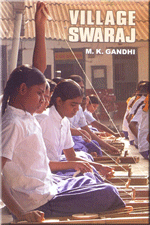
P.O. SEVAGRAM, DIST.WARDHA 442102, MS, INDIA. Phone: 91-7152-284753
FOUNDED BY MAHATMA GANDHI IN 1936
Village Swaraj

VILLAGE SWARAJ
Written by :M. K. Gandhi
Compiled by : H. M. Vyas
Table of Contents
- The Meaning of Swaraj
- A Picture of an Ideal Society
- Which Way Lies Hope?
- Cities and Villages
- Village Swaraj
- Basic Principles of Village Swaraj
- Bread Labour
- Equality
- Theory of Trusteeship
- Swadeshi
- Self-sufficiency and Co-operation
- Panchayat Raj
- Nai Talim
- Agriculture and Cattle Welfare-I
- Agriculture and Cattle Welfare-II
- Agriculture and Cattle Welfare-III
- Agriculture and Cattle Welfare-IV
- Agriculture and Cattle Welfare-V
- Khadi and Spinning
- Other Village Industries
- Village Transport
- Currency, Exchange and Tax
- Village Sanitation
- Village Health and Hygiene
- Diet
- Village Protection
- The Village Worker
- Government and The Villages
- India and The World
About This Book
Written by : M. K. Gandhi
Compiled by : H. M. Vyas
First Edition : 5,000 copies, December 1962
I.S.B.N : 81-7229-140-X
Printed and Published by : Jitendra T. Desai
Navajivan Mudranalaya,
Ahmedabad - 380 014,
India.
© Navajivan Trust, 1962
Download
Chapter-2: A Picture of an Ideal Society
Gandhiji found the picture of his free India in its essentials embodied in a song that was sung at one of his evening prayers in Bhangi Colony, New Delhi. It gripped "him. He translated it into English and had it sent to Lord Pethick-Lawrence. It was as follows:
We are inhabitants of a country
where there is no sorrow and no suffering,
Where there is no illusion nor anguish,
no delusion nor desire,
Where flows the Ganges of love
and the whole creation is full of joy,
Where all minds flow in one direction,
and where there is no occasion for sense of time,
All have their wants satisfied;
Here all barter is just,
Here all are cast in the same mould,
Here is no lack nor care,
No selfishness in any shape or form,
No high no low, no master no slave;
All is light, yet no burning heat,
That country is within you—
It is Swaraj, Swadeshi,
The home within you—
Victory! Victory! Victory!
He realizes it who longs for it.
Mahatma Gandhi – The Last Phase, 1956, Vol. I, p. 190-91
What emerged was a picture of the India of his dreams.
A picture of a casteless and classless society, in which there are no vertical divisions but only horizontal; no high, no low; all service has equal status and carries equal wages; those who have more use their advantage not for themselves but as a trust to serve others who have less; the motivating factor in the choice of vocations is not personal advancement but self-expression and self-realization through the service of society. Since all service here ranks the same and carries equal wages, hereditary skills are conserved and developed from generation to generation instead of being sacrificed to the lure of personal gain. The principle of community service replaces unrestricted, soulless competition. Everybody is a toiler with ample leisure, opportunity, and facilities for education and culture. It is a fascinating world of cottage crafts and intensive, small-scale farming co-operatives, a world in which there is no room for communalism or caste. Finally, it is the world of Swadeshi in which the economic frontiers are drawn closer but the bounds of individual freedom are enlarged to the maximum limit; everybody is responsible for his immediate environment and all are responsible for society. Rights and duties are regulated by the principle of interdependence, and reciprocity; there is no conflict between the part and the whole; no danger of nationalism becoming narrow, selfish or aggressive or internationalism becoming an abstraction where the concrete is lost in a nebulous haze of vague generalities.
Mahatma Gandhi – The Last Phase, 1956, Vol. I, p. 539-40
There will be neither paupers nor beggars, nor high nor low, neither millionaire employers nor half- starved employees, nor intoxicating drinks. or drugs. There will be the same respect for women as vouchsafed to men and the chastity and purity of men and women will be jealously guarded. Where every woman except one's wife, will be treated by men of all religions, as mother, sister or daughter according to her age. Where there will be no untouchability and where there will be equal respect for all faiths. They will be all proudly, joyously and voluntarily bread labourers. I hope everyone who listens to me or reads these lines will forgive me if stretched on my bed and basking in the sun, inhaling life-giving sunshine, I allow myself to indulge in this ecstasy.
H. I., 18-1-’48, p. 526